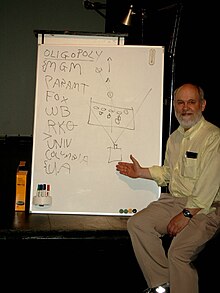David Bordwell | |
|---|---|
 Bordwell lecturing on the economics of the film industry; his whiteboard diagram shows the oligopoly that existed in the US film industry during the Golden Age of Hollywood. | |
| Born | July 23, 1947 Penn Yan, New York, U.S. |
| Died | February 29, 2024 (aged 76) Madison, Wisconsin, U.S. |
| Occupation(s) | Film historian, film theorist |
| Known for | Neoformalism, historical poetics, linguistic film theory |
| Spouses |
|
| Website | http://www.davidbordwell.net |
David Jay Bordwell (/ˈbɔːrdwəl/; July 23, 1947 – February 29, 2024) was an American film theorist and film historian.[1] After receiving his PhD from the University of Iowa in 1973, he wrote more than fifteen volumes on the subject of cinema including Narration in the Fiction Film (1985), Ozu and the Poetics of Cinema (1988), Making Meaning (1989), and On the History of Film Style (1997).[2]
With his wife Kristin Thompson, Bordwell wrote the textbooks Film Art (1979) and Film History (1994). Film Art, in its 12th edition as of 2019, is still used as a text in introductory film courses. With aesthetics philosopher Noël Carroll, Bordwell edited the anthology Post-Theory: Reconstructing Film Studies (1996), a polemic on the state of contemporary film theory. His largest work was The Classical Hollywood Cinema: Film Style and Mode of Production to 1960 (1985), written in collaboration with Thompson and Janet Staiger. Several of his more influential articles on theory, narrative, and style were collected in Poetics of Cinema (2007), named in homage to the famous anthology of Russian formalist film theory Poetika Kino, edited by Boris Eikhenbaum in 1927.
Bordwell spent nearly the entirety of his career as a professor of film at the University of Wisconsin–Madison, retiring in 2004[1] and becoming the Ledoux Professor of Film Studies, Emeritus in the Department of Communication Arts. Film theorists who wrote their dissertations under his advisement include Edward Branigan, Murray Smith, and Carl Plantinga. He and Thompson maintained the blog "Observations on film art" for their ruminations on cinema.
- ^ a b Dargis, Manohla (April 23, 2010). "You Can Judge a Book by Its Movie". The New York Times. ISSN 0362-4331. Retrieved December 12, 2022.
- ^ Bordwell, David; Carroll, Noel (February 15, 1996). UW Press - : Post-Theory: Reconstructing Film Studies, Edited by David Bordwell and Noël Carroll. Univ of Wisconsin Press. ISBN 978-0-299-14944-4.